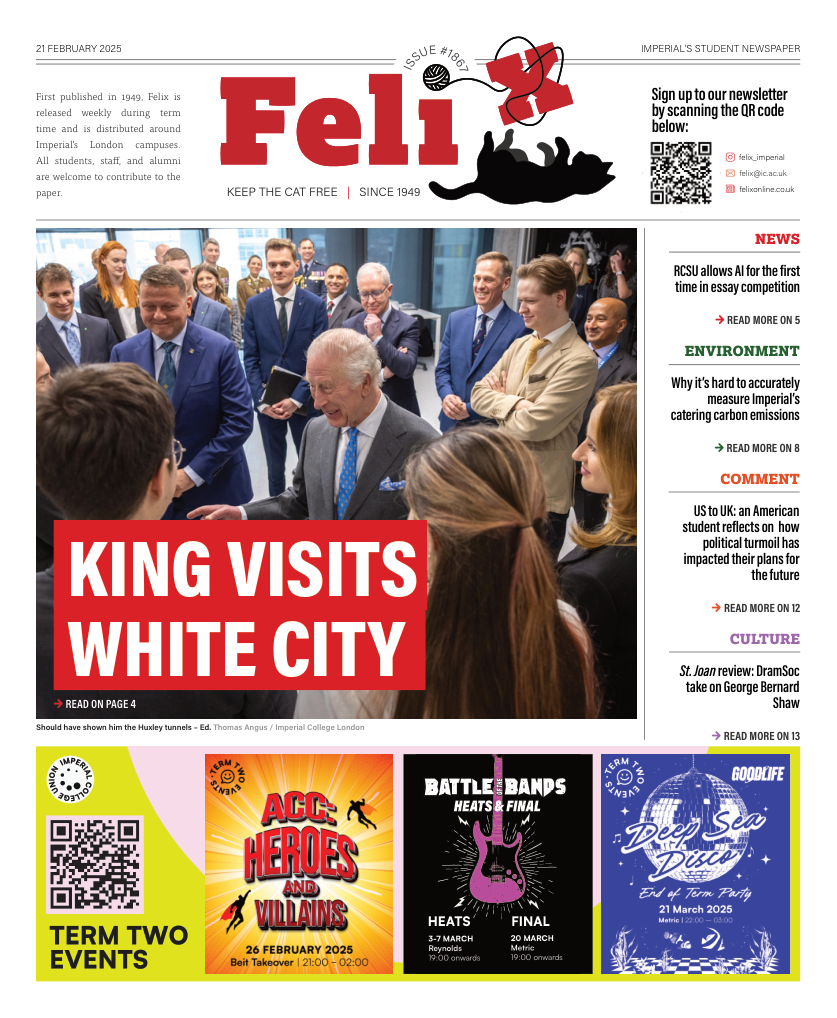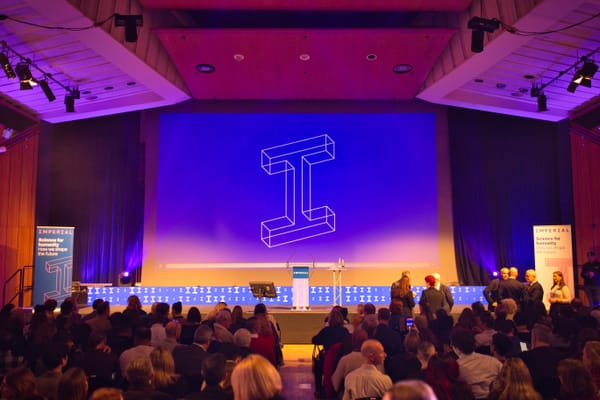Letter to the Editor: on being "useful"
Dear Editor,
Last week, I was reminded that deadlines are not suggestions. Imperial College London is a place of purpose. Underneath us all hums the constant note of motion and progress. The students here are not simply studying; they are solving, building, innovating. And God they must. Walk through the campus, and you can feel it: the quiet anxiety of minds at work, the relentless pursuit of something bigger than themselves.
Thus, it comes as no surprise that President Brady’s address is underpinned by the relentless notion of usefulness. It is a word that appears repeatedly, in mission statements, funding proposals, conversations about the future. Imperial is not a university; it is a factory of impact. Its graduates drive industries, its research shapes policy, its discoveries change lives. And there is pride in that, rightly so. Few institutions can claim to be as tightly woven into the fabric of progress as Imperial. But pride can be deadly. Hubris is at large in this institution. It percolates through the entire hierarchy, through leadership teams down to my own conversations over dinner whether I like it or not. The pride of being 2nd after MIT, beating out Oxbridge. The pride in “being better.” The pride in “being useful.” There is so much irony in the name of our university. Imperial is a word historically tied to dominance, conquest, and control. It promises an institution of unrivalled power and influence a place where knowledge is both a weapon and a currency.
I often think about the friends who struggle, who disappear from social circles under the weight of expectations. The ones who stopped loving what they studied because it became a source of anxiety rather than curiosity. I think that has been all of us at some point. The ones who stayed up not because they were inspired, but because they were afraid of falling behind. I know it is normal for university life but ours particularly feels brutal by design. We are force-fed these lines about support and services, presented as if they are here for us. In reality, they feel like little more than tick-box exercises for the institution. These services are a means to an end, with the end being our productivity, our usefulness to the institution. We are told we have access to mental health resources, but in the end, it is not about supporting our well-being; it is about making sure we continue to perform at the highest level of use that we can.
I do not regret coming here. But I do wish that, sometimes, we were allowed to be useless. Not in the sense of being idle, but in the sense of learning for learning’s sake. Perhaps that is a shallow thing for me to say, spending a small nine thousand two hundred and fifty pounds a year to simply enjoy. I can’t help and notice the irony that while Brady himself commands a salary of £375,000 and is handsomely compensated for overseeing the relentless pursuit of usefulness, it is those of us that feed into the hierarchy, students and lower-paid research staff, who endure the long hours, mental strain, and exhaustion that this culture breeds. We are expected to give everything in service of measurable success, measurable usefulness.
Anonymous
Response
Dear Reader,
I have been trying to write a response for this all week. I have several drafts trying to think of what to say, but I can’t really think of a response, partly because I agree, but also because I feel what you feel goes beyond the College.
Yes, Imperial is a degree factory in a way, and it feels like to succeed we have to let the parts of ourselves that make us human disappear. It is hard to try and enjoy learning, and to spend the time at university doing something more meangingful and worthwhile than something for your career. What I will say is this: as much as it is worthwhile being useful, whatever that means. “Increase shareholder value.”
I think that pursuing STEM alone, not providing opportunities to enrich ourselves for our own stake, and perpetuating the notion that productivity and economic activity (even if temporarily) are what grants any body, any person their innate value is a dangerous one. One must only look across to America, to see the machinations of the tech oligarchs. One can also look at their hubris, spurred on by the fact they are all tech oligarchs, and have extensive STEM backgrounds.
I read the transcript and thought, guess that makes a lot of the people I grew up around not of use – useless, one could say. It’s not because they’re economically inactive, it’s simply that wage compression and a lack of investment up North means it’s hard to get a job where you are a net contributor to the state and economy. I’m not shy to say I come from a working class background, and I’m proud of the fact my accent is sexy and cool and I sound like Zayn Malik, but I’ve heard similar rhetoric all my life.
There is an immense pressure on Generation Z, and there aren’t many rewards. To be told to continue to remain useful is annoying when one can’t afford a house, even if they earn excellent wages in the financial sector, or leave outside a house share, or even afford to live. Nicholas, 30 ans, springs to mind. Deep cuts. On a lighter note, we’ll all probably be dead via nuclear annihilation or climate catsatrophe in the next twenty years so at least the rat race shit show will be over soon.
Best, Ed.







